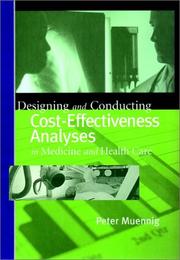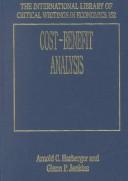| Listing 1 - 8 of 8 |
Sort by
|
Dissertation
Year: 2002
Abstract | Keywords | Export | Availability | Bookmark
 Loading...
Loading...Choose an application
- Reference Manager
- EndNote
- RefWorks (Direct export to RefWorks)
rabbits --- Zootechny --- Cost benefit analysis --- Benin. --- Benin
Dissertation
Year: 2002
Abstract | Keywords | Export | Availability | Bookmark
 Loading...
Loading...Choose an application
- Reference Manager
- EndNote
- RefWorks (Direct export to RefWorks)
Guinea pigs --- Zootechny --- Animal feeding --- Feeding habits --- Cost benefit analysis --- Peru
Dissertation
Year: 2002 Publisher: Enschede PrintPartners Ipskamp
Abstract | Keywords | Export | Availability | Bookmark
 Loading...
Loading...Choose an application
- Reference Manager
- EndNote
- RefWorks (Direct export to RefWorks)
Kidney Failure, Chronic --- Cost-Benefit Analysis --- Kidney Transplantation --- Renal Replacement Therapy --- economics --- economics --- economics
Dissertation
ISBN: 9058086720 Year: 2002 Publisher: Wageningen : Wageningen University,
Abstract | Keywords | Export | Availability | Bookmark
 Loading...
Loading...Choose an application
- Reference Manager
- EndNote
- RefWorks (Direct export to RefWorks)
Models --- Sustainable agriculture --- Cost benefit analysis --- Input output analysis --- agricultural sector --- Production --- Environmental impact --- farming systems --- Organic agriculture --- Decision making --- Netherlands

ISBN: 9780787960131 0787960136 Year: 2002 Publisher: San Francisco Jossey-Bass
Abstract | Keywords | Export | Availability | Bookmark
 Loading...
Loading...Choose an application
- Reference Manager
- EndNote
- RefWorks (Direct export to RefWorks)


ISBN: 2130528058 Year: 2002 Publisher: Paris : PUF - Presses Universitaires de France,
Abstract | Keywords | Export | Availability | Bookmark
 Loading...
Loading...Choose an application
- Reference Manager
- EndNote
- RefWorks (Direct export to RefWorks)
Justice --- Evaluation --- 330.322.54 --- #SBIB:35H140 --- #SBIB:042.IO --- #SBIB:35H415 --- #SBIB:35H431 --- #SBIB:35H143 --- 340.142 <44> --- Cost-benefit-analysis. Input-output-analyse. Economische evaluatie. Kosten-batenanalyse. Rendement van investeringen --- Bijzondere korpsen: justitie, leger, politie: algemene werken --- Beleidscyclus: evaluatie --- Beleidssectoren: binnenlands beleid en justitie --- Bijzondere korpsen: rechterlijke macht --- Rechtspraak. Jurisprudentie--Frankrijk --- 340.142 <44> Rechtspraak. Jurisprudentie--Frankrijk --- 330.322.54 Cost-benefit-analysis. Input-output-analyse. Economische evaluatie. Kosten-batenanalyse. Rendement van investeringen --- Justice, Administration of --- Administration of justice --- Law --- Courts --- Economic aspects --- Law and legislation

ISBN: 1858981948 Year: 2002 Publisher: Cheltenham Elgar
Abstract | Keywords | Export | Availability | Bookmark
 Loading...
Loading...Choose an application
- Reference Manager
- EndNote
- RefWorks (Direct export to RefWorks)
Social costs. Social benefits --- Cost effectiveness --- #SBIB:35H220 --- #SBIB:35H410 --- #SBIB:024.IO --- Benefit cost analysis --- Capital output ratios --- Cost benefit analysis --- Costs, Industrial --- Engineering economy --- Value analysis (Cost control) --- Financieel management bij de overheid: algemene werken --- Beleidscyclus: algemene werken --- Cost effectiveness.
Book
ISBN: 1462318614 1452785538 1282108301 9786613801654 1451901291 Year: 2002 Publisher: Washington, D.C. : International Monetary Fund,
Abstract | Keywords | Export | Availability | Bookmark
 Loading...
Loading...Choose an application
- Reference Manager
- EndNote
- RefWorks (Direct export to RefWorks)
This paper discusses issues relating to the domestic pricing of petroleum in oil-producing countries. It finds that in most major oil-exporting countries, government policies keep domestic prices below free-market levels, resulting in implicit subsidies that equaled 3.0 percent of GDP, on average, in 1999. Moreover, the paper argues, these petroleum subsidies are inefficient and inequitable-entailing substantial opportunity costs in terms of forgone revenue or productive spending-and also procyclical, complicating macroeconomic management. Nonetheless, the elimination of petroleum subsidies is often politically difficult, although countervailing measures and publicity campaigns can help engender support for reform.
Investments: Energy --- Macroeconomics --- Public Finance --- Allocative Efficiency --- Cost-Benefit Analysis --- Energy and the Macroeconomy --- Energy: Government Policy --- Energy: Demand and Supply --- Prices --- Energy: General --- Macroeconomics: Consumption --- Saving --- Wealth --- Investment & securities --- Energy industries & utilities --- Oil prices --- Oil --- Consumption --- Energy subsidies --- Fuel prices --- Commodities --- National accounts --- Expenditure --- Petroleum industry and trade --- Economics --- Expenditures, Public --- Ecuador
| Listing 1 - 8 of 8 |
Sort by
|

 Search
Search Feedback
Feedback About
About Help
Help News
News